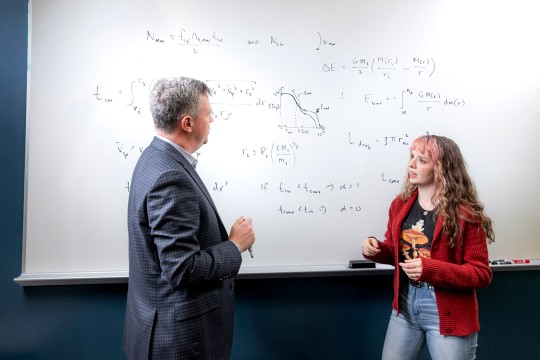National Science Foundation Awards RIT $300,000 for Speech-to-Text Research
Next generation technology for deaf and hard-of-hearing students will work via cell phones or PDAs
The National Science Foundation’s Research in Disability Education program has awarded RIT’s National Technical Institute for the Deaf a grant of $300,000 to develop a remote transcription technology to assist deaf students—providing them access to spoken information when on field trips or in other settings outside the classroom.
NTID’s Dr. Michael Stinson and his team, whose members include researchers from three colleges of RIT including NTID, the College of Science and the Golisano College of Computing and Information Sciences, will use the grant for their project, “Supporting Deaf and Hard of Hearing Undergraduate Students in STEM (science, technology, engineering and mathematics) Field Settings with Remote Speech-to-Text Services.”
The RIT/NTID researchers will develop a remote speech-to-text assistive technology that allows individuals who are deaf or hard-of-hearing, including those with low vision, to view real-time transcription in remote/non-traditional settings via a handheld device, such as a cell phone or PDA.
“This new technology will provide access to spoken information for students in situations in which it is currently difficult to provide access, such as field trips for science classes and other learning experiences in which students are mobile,” said Dr. T. Alan Hurwitz, RIT vice president and CEO/dean of NTID.
The project will also evaluate the extent to which remote speech-to-text services aid students’ communication access and learning in these non-traditional learning environments.
The team for this project has already been developing, researching and disseminating the C-Print speech-to-text system, a widely used support service for deaf and hard-of-hearing students, for more than 15 years. This next generation of C-Print technology allows for the delivery of information to students wirelessly in a variety of remote settings, thus allowing them the same access to information as their hearing peers.
Rochester Institute of Technology is internationally recognized as a leader in computing, engineering, imaging technology, fine and applied arts, and for providing unparalleled support services for students with hearing loss. RIT is home to the National Technical Institute for the Deaf, where more than 1,100 students with hearing loss from around the world study, live and socialize with 14,400 hearing students on RIT’s Rochester, N.Y., campus. U.S. News and World Report has consistently ranked RIT among the nation’s leading comprehensive universities.
Web address: http://www.rit.edu/NTID.
For more NTID news, visit http://www.rit.edu/ntid/newsroom.











